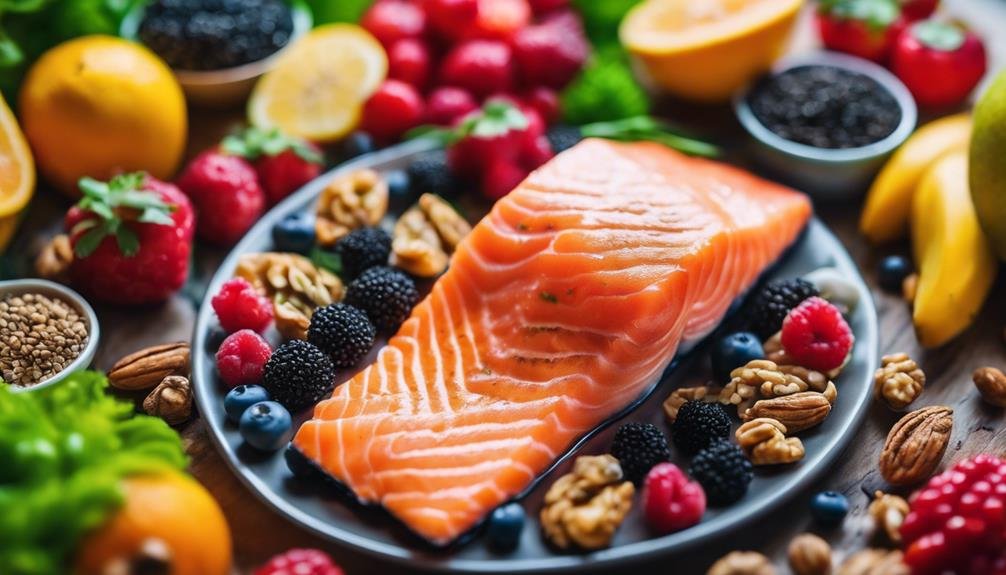"Cherishing Little Steps - A Haven for Baby and Family Journeys"
The Role of Omega-3 in Toddler Development: An Expert's Guide
Imagine Omega-3 as the gentle gardener nurturing the fertile soil of your toddler's development. An expert's guide on this essential nutrient unveils a pathway to understanding the profound impact it has on your child's growth. From boosting brain function to fostering a robust immune system, Omega-3 is a key player in shaping your toddler's future. But what specific roles does Omega-3 play in your little one's development, and how can you ensure they receive adequate amounts? Let's delve deeper into the world of Omega-3 and its significance in your toddler's journey to optimal health and cognitive prowess.
Key Takeaways
- Omega-3 supports brain development and cognitive abilities in toddlers.
- Fatty fish, seeds, and nuts rich in Omega-3 aid in memory, learning, and problem-solving skills.
- Balanced Omega-3 intake enhances growth, vision, and immune function in toddlers.
- Include sources like salmon, chia seeds, and flaxseeds for a well-rounded Omega-3 intake.
- Consult pediatricians for advice on meeting the recommended 700mg Omega-3 daily intake for toddlers aged 1-3.
Importance of Omega-3 for Toddlers

Understanding the vital role that Omega-3 plays in the development of toddlers is crucial for fostering their overall growth and well-being. Omega-3 fatty acids are essential nutrients that support various functions in your toddler's body. These healthy fats are crucial for brain development, eye health, and immune system function. As your toddler continues to grow and learn, Omega-3s help support their cognitive abilities and language development.
Including Omega-3 sources in your toddler's diet, such as fatty fish like salmon, chia seeds, and walnuts, can have a significant impact on their overall health. These nutrients are like superheroes for your toddler's body, working behind the scenes to ensure everything is running smoothly. By providing your toddler with foods rich in Omega-3s, you're giving them the building blocks they need to thrive.
Cognitive Development and Omega-3
Enhancing your toddler's cognitive development can be supported through incorporating Omega-3 rich foods into their diet. Omega-3 fatty acids play a crucial role in brain function and development, making them essential for your little one's growing mind. Research suggests that DHA, a type of Omega-3, is particularly important for cognitive functions like memory, problem-solving, and attention span.
| Omega-3 Rich Foods | Benefits for Cognitive Development |
|---|---|
| Fatty Fish (Salmon, Tuna) | Supports memory and learning abilities |
| Chia Seeds, Flaxseeds | Enhances problem-solving skills |
| Walnuts, Almonds | Improves attention span and focus |
Growth and Omega-3 Benefits

Incorporating Omega-3 rich foods into your toddler's diet can support their growth by providing essential nutrients for overall development. Omega-3 fatty acids, such as DHA and EPA, play a crucial role in brain development, vision, and immune function, all of which are essential for your toddler's growth and well-being. These fatty acids are known to help in the development of the brain and nervous system, contributing to improved cognitive function, memory, and learning abilities. Additionally, Omega-3s have anti-inflammatory properties that can help reduce inflammation in the body, supporting overall health and growth.
Studies have shown that children who consume sufficient Omega-3s tend to have better growth patterns and development compared to those with lower intake. Including sources of Omega-3 like fatty fish, flaxseeds, and chia seeds in your toddler's diet can have long-lasting benefits on their growth trajectory. By prioritizing Omega-3 rich foods, you're providing your toddler with the necessary building blocks for healthy growth and development.
Sources of Omega-3 for Toddlers
To ensure your toddler receives sufficient Omega-3 fatty acids, consider incorporating sources like fatty fish, flaxseeds, and chia seeds into their diet for optimal growth and development. Fatty fish such as salmon, mackerel, and sardines are rich in EPA and DHA, two crucial types of Omega-3s that support brain development. Introducing these fish in a toddler-friendly way, like in fish sticks or mixed into pasta, can make them more appealing to young taste buds.
For vegetarian or vegan toddlers, flaxseeds and chia seeds are excellent plant-based sources of Omega-3 fatty acids. These can be ground and added to oatmeal, smoothies, or baked goods. Including a variety of sources ensures that your toddler receives a good balance of Omega-3s for their overall health.
Recommendations for Omega-3 Intake

Ensure your toddler's optimal growth and development by following recommended guidelines for Omega-3 intake. Omega-3 fatty acids are essential for your child's brain development and overall health. The American Academy of Pediatrics recommends that toddlers aged 1-3 years consume about 700 milligrams of Omega-3 fatty acids daily. This can be achieved through a balanced diet that includes foods rich in Omega-3 such as fatty fish like salmon, mackerel, and sardines, as well as plant-based sources like chia seeds, flaxseeds, and walnuts.
If your toddler is a picky eater and struggles to consume enough Omega-3 rich foods, you may consider supplementing their diet with a high-quality fish oil or algae oil supplement. Always consult with your pediatrician before introducing any supplements to your child's diet to ensure they're safe and appropriate.
Frequently Asked Questions
Can Toddlers Get Too Much Omega-3?
You might wonder if toddlers can have too much omega-3. Well, too high doses can cause issues like excessive bleeding and lower immunity. Always consult your healthcare provider to ensure the right balance for your child's health.
Are There Any Side Effects of Omega-3 Supplements for Toddlers?
You might wonder about omega-3 side effects for toddlers, but worry not! When given in appropriate doses, omega-3 supplements are generally safe. However, some children may experience digestive issues or a fishy aftertaste.
How Can Picky Eaters Get Enough Omega-3 in Their Diet?
To ensure picky eaters get enough omega-3, try incorporating foods like flaxseeds, chia seeds, walnuts, or fish into their diet. Smoothies with hidden veggies and fruits can be a fun way to sneak in these essential nutrients.
Does Cooking Affect the Omega-3 Content in Foods for Toddlers?
When cooking, remember that high heat or prolonged cooking can decrease omega-3 content in foods for toddlers. Opt for gentle methods like steaming or baking to preserve these essential nutrients, ensuring your little one's healthy development.
Are There Any Interactions Between Omega-3 and Medications for Toddlers?
Interactions between omega-3 and toddler medications can happen. Some meds, like blood thinners, may be affected by omega-3 supplements. Always talk to the doctor before giving any new supplement to your toddler.
Conclusion
In conclusion, Omega-3 plays a crucial role in the development of toddlers, supporting their cognitive abilities and overall growth.
Have you ever wondered how a simple addition of Omega-3 rich foods or supplements can have a profound impact on your child's brain development and health?
Remember, ensuring a balanced intake of Omega-3 is key to promoting optimal growth and cognitive function in your little one.
Give them the best start in life with the power of Omega-3!



child porn
Здравствуйте!
Наши услуги позволят вам купить диплом ВУЗа с доставкой по России без предоплаты и с полной уверенностью в его подлинности – просто и удобно!
http://saksx-attestats.ru/
Закажите диплом Вуза по выгодной цене с доставкой в любой регион России без предоплаты и уверенностью в его законности.
Закажите диплом ВУЗа с гарантированной подлинностью и доставкой по России без предварительной оплаты – просто, надежно, выгодно!